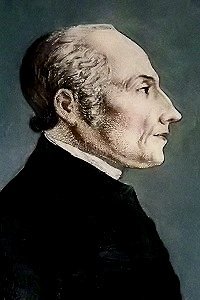
Born: 1740, Strasbourg, France.
Died: June 1, 1826, Waldersbach, France.
Buried: Urbach (now Fouday), Bas-Rhin, France.

Born: 1740, Strasbourg, France.
Died: June 1, 1826, Waldersbach, France.
Buried: Urbach (now Fouday), Bas-Rhin, France.
Son of a Strasbourg teacher, Oberlin earned a doctorate in theology at the university in his hometown.
In 1767, he became pastor of a remote and barren region in the Steintal (Ban-de-la-Roche), a valley in the Vosges on the borders of Alsace and Lorraine. Oberlin set himself to better the material and spiritual condition of the inhabitants.
Directing himself to their spiritual condition, each month he preached three sermons in French and one in German.
He began his work for their material improvement by building roads through the valley and erecting bridges, inspiring the peasantry to the enterprise by personal example.
He practiced medicine among them, founded a savings and loan bank, and introduced an improved system of agriculture. Substantial cottages were erected, and various industrial arts introduced.
He founded an itinerant library, originated infant schools, and established an ordinary school at each of the five villages in the parish. In the work of education, he received great assistance from his housekeeper, Louisa Scheppler (1763–1837).
His orphan asylums were the beginning of the many Oberlinvereine for the protection of children.
Oberlin College in Oberlin, Ohio, is named after him.